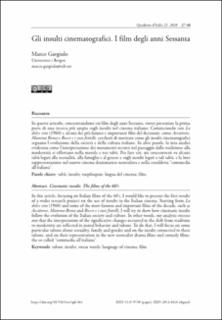Gli insulti cinematografici. I film degli anni Sessanta
Journal article, Peer reviewed
Published version

Åpne
Permanent lenke
https://hdl.handle.net/11250/2759149Utgivelsesdato
2020Metadata
Vis full innførselSamlinger
Sammendrag
In questo articolo, concentrandomi sui film degli anni Sessanta, vorrei presentare la prima parte di una ricerca più ampia sugli insulti nel cinema italiano. Cominciando con La dolce vita (1960) e alcuni dei più famosi e importanti film del decennio, come Accattone, Mamma Roma e Rocco e i suoi fratelli, cercherò di mostrare come gli insulti cinematografici seguano l’evoluzione della società e della cultura italiane. In altre parole, la mia analisi evidenzia come l’interpretazione dei mutamenti occorsi nel passaggio dalla tradizione alla modernità si riflettano nella morale e nei tabù. Per fare ciò, mi concentrerò su alcuni tabù legati alla sessualità, alla famiglia e al genere e sugli insulti legati a tali tabù, e la loro rappresentazione nel nuovo cinema drammatico neorealista e nella cosiddetta “commedia all’italiana”.
//
In this article, focusing on Italian films of the 60’s, I would like to present the first results of a wider research project on the use of insults in the Italian cinema. Starting from La dolce vita (1960) and some of the most famous and important films of the decade, such as Accattone, Mamma Roma and Rocco e i suoi fratelli, I will try to show how cinematic insults follow the evolution of the Italian society and culture. In other words, my analysis stresses out that the interpretation of the significative changes occurred in the shift from tradition to modernity are reflected in moral behavior and taboos. To do that, I will focus on some particular taboos about sexuality, family and gender and on the insults connected to these taboos, and on their representation in the new neorealist drama films and comedy films, the so called “commedia all’italiana”.
